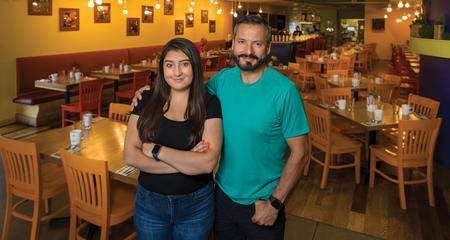
Languishing: How We Can Overcome This Mental Health Struggle and Learn To Thrive
Whether we know it or not, many of us have experienced “languishing” during the COVID-19 pandemic. Understanding it can help you regain your energy and enthusiasm.

We have been met with no shortage of emotions over the course of the COVID-19 pandemic. They have grown and changed in intensity with the number of positive COVID-19 cases rising and falling, with the stream of polarized opinions found in the media and our own lives, and with the hope that we can eventually return to some semblance of normalcy.
The hardest emotions to grapple with are the ones that we can’t quite articulate. We are certainly affected by the negative feeling itself, but not knowing what to call it can add to our distressed mental state.
In a New York Times article, Adam Grant, a psychologist and professor at the Wharton School of the University of Pennsylvania, describes a feeling of going through the motions of normal life without much excitement or enjoyment. It has a numbing effect that alters our perception of what’s going on around us.
It’s a feeling that many have experienced during the pandemic. Yet they may not know it has a name: languishing.
What Is Languishing?
Languishing is an emotion (or combination of emotions) that we feel when we are experiencing emptiness or a lack of energy and focus. It puts us in a state where we are not necessarily in a fight-or-flight survival mode, but we are also not thriving.
Sociologist Corey Keyes coined the term and described it as one end of a mental health spectrum. The other end would be flourishing, characterized by having positive emotions and functioning well mentally and socially. While languishing is not a mental illness, it can lead to someone developing one. In his research, Keyes found that the risk of a major depressive episode was almost six times greater in languishing adults than those who were flourishing.
For those who are languishing, it may be difficult to acknowledge what they’re going through. However, putting a name to what you’re feeling can actually help you overcome it. “By naming the emotion you’re experiencing and recognizing that it's okay to feel that way, it puts you more in the driver's seat of that emotion,” said Lauren Demshar Abbott, LCSW, psychotherapist with the Froedtert & the Medical College of Wisconsin health network.
Considering the constant change and uncertainty we live in today — not to mention pandemic fatigue — what can we do to get out of this emotional state and improve our overall mental health?
Be Intentional About Self-Care
Experts have suggested many ways to cope during the pandemic. Similarly, there is not one guaranteed solution to overcome languishing. Many people have decided to take more time for self-care in hopes of bettering their physical, mental and emotional health, but Demshar Abbott warns that self-care just for the sake of doing it is likely not going to help. Copying someone else’s self-care routine may not have the same positive effect for you. There’s also the consumerism angle; some products marketed as self-care solutions may only have that label as a sales tactic.
Instead, Demshar Abbott encourages people to be intentional with their self-care activities, and they can be as simple as talking with a friend or listening to music. “It doesn't have to be like something very grand, but ask yourself at the end of it, ‘Did this feel restorative?’” she said.
It’s equally important to avoid activities that deplete your energy. Otherwise, you could get stuck in a cycle of languishing. “If you're a person who feels even more burnt out at the end of scrolling through social media for half an hour, step back from that,” Demshar Abbott said. “If you're a person who gets something out of it, by all means, do it.”
Find Your Flow
Another way to move beyond languishing that’s been vetted by Grant and other psychologists is through flow, a state of mind where an individual is completely immersed or engaged in an activity. Because you’re so focused on the activity, you may lose your awareness of time. Flow often occurs when you’re doing something that you enjoy and also provides a challenge or opportunity to learn something new (i.e., finishing a crossword puzzle). Research shows that the release of the brain chemical dopamine can increase during flow, which can make people feel greater enjoyment and energy.
Finding flow is different for everyone, and it can happen during a variety of activities that could also be categorized as self-care. These may include:
- Working on a puzzle or word game
- Reading a book or watching a movie or show, where you get attached to the characters
- Playing a game with your kids in the yard
- Indulging your artistic side by trying your hand at drawing, painting, writing, learning a musical instrument or new language
- Engaging in a sport of choice or dancing
- Changing up your exercise routine to include a new activity or challenge
- Researching a topic of interest and learning all you can about it
It’s hard to achieve flow if you’re distracted, so set aside some uninterrupted time to indulge in an interesting project, a worthwhile goal or a meaningful conversation. Avoid the distraction of looking at e-mails, texts and social media during this time to enhance your focus.
As you work to reverse your languishing, remember that those feelings will not disappear overnight. They also won’t last forever. Be patient in your efforts. Try out different ways to stay mentally and physically healthy during the pandemic. Take small steps and set small daily goals. Soon, you’ll start rediscovering some of the energy and enthusiasm you’ve been missing.




